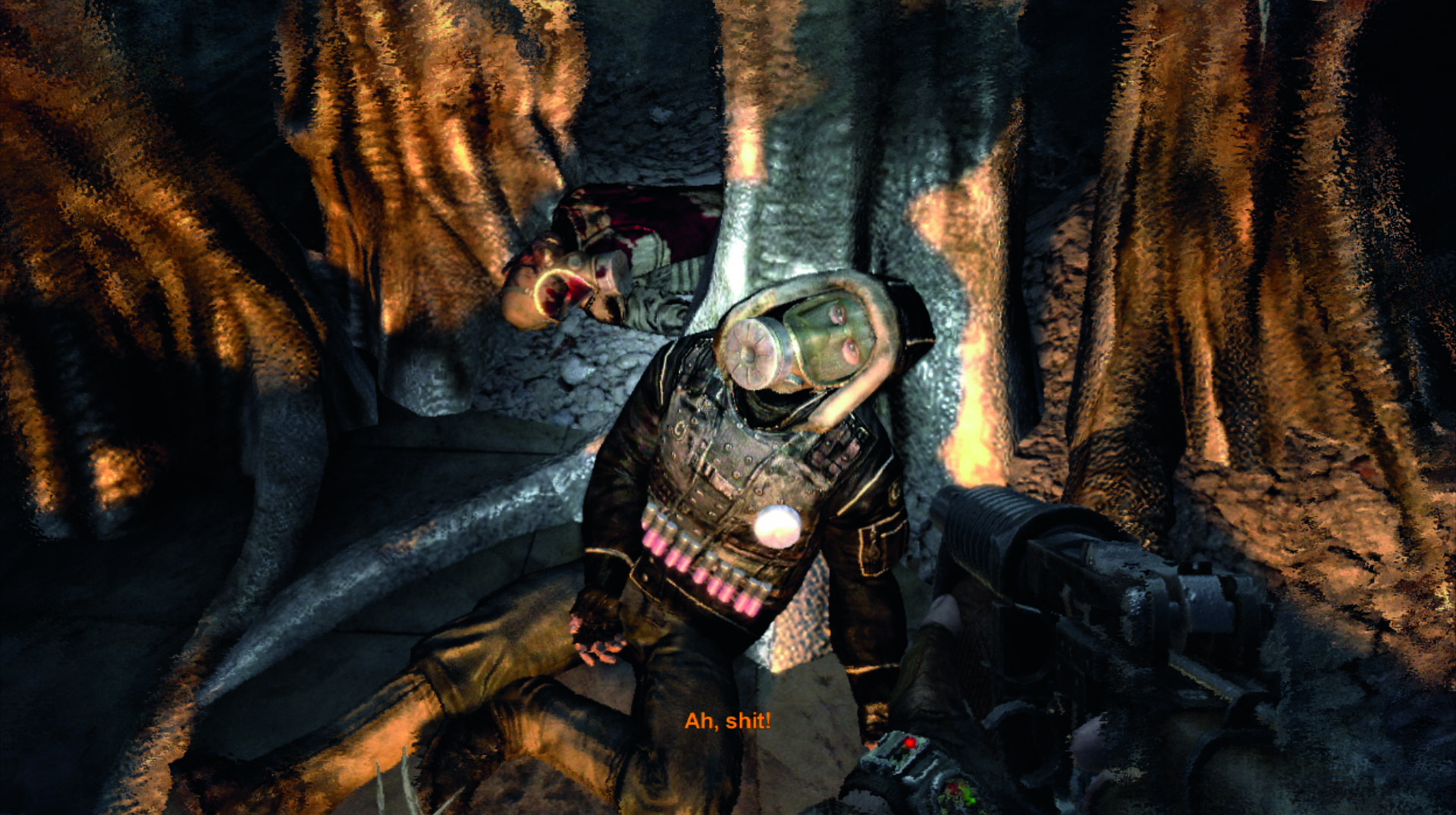GamesRadar+ Verdict
Pros
- +
Evocative paranormal atmosphere
- +
Superb attention to detail
- +
Play it cautious
- +
and the shooting issues dissolve
Cons
- -
The shooting sucks
- -
May be too unforgiving for some
- -
A few naive design decisions
Why you can trust GamesRadar+
You’re crouched in a corner clutching your AK-47 with both hands. You’re down to your last magazine. Five monsters are trying to get a lock on your scent in the next room and just beyond them a group of Nazis are sitting at their sentry post waiting for movement. You should have saved some ammunition but you blew it all to buy a sniper rifle at the last outpost. Nietzschean law doesn’t apply: what doesn’t kill you here just makes you weaker. You want to go back but youcan’t: the shelter doors are locked and won’t be opening again any time soon. Life in the Metro is tough – but above ground the situation’s even worse.
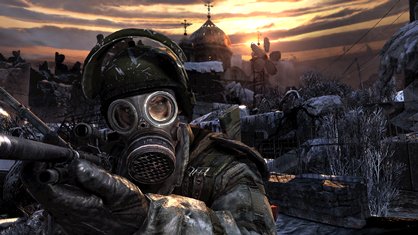
Your mother would have told you this but she died when you were young. Life in a cramped station was all you knew, so who can blame you for wanting to venture outside? But the sky doesn’t look like you’d imagined. The postcards pinned to your wall depict clear blue heavens. Here, though, rolling storm clouds and dust blot out the sun. You count yourself lucky given that the hole in the ozone layer makes sunlight deadly but then you remember the tough spot you’re in and your grip on the weapon tightens. It’s crazy to let your mind wander like this and you blame it on your gas mask’s clogged filters. Your visor slowly fills with condensation. Your laboured breathing is now accompanied by pronounced wheezes. Any louder and you’ll alert the monsters. What a fine mess you’re in – not enough air, not enough bullets and no options but to press on. But you’re having the time of your life.
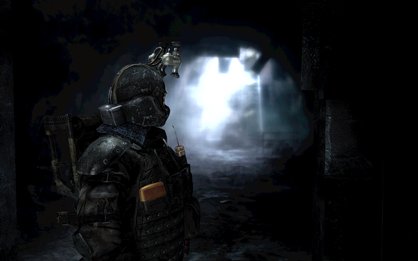
Above: The world of Metro is a completely coherent and believable one
Metro 2033 is going to have its fair share of detractors. We’ll lay down the Joker card early: the shooting isn’t all that great. As we feared last issue, the guns do feel underpowered and enemies sometimes absorb a bullet or two without even flinching. If you’re after a great blaster then Metro 2033 may not be for you. Nor is it designed to be. Bioshock isn’t a great blaster either, but that certainly hasn’t held it back.
If you play Metro 2033 in the right way – stealthing and planning assaults like John Rambo Version One rather than barging through the front door with double rocket launchers like his carnage-loving later-ego – the shooting issues become non-issues. Decline, and fail to look past the resulting gunplay shortcomings, and you’ll officially have a heart colder than the Moscow nuclear winter. Like 2K’s watery adventure, Metro thrives on its atmosphere. And it’s in this area that 4A Games delivers in way perhaps nobody expected.
For starters, the dank tunnels of Russia’s Metro system are more evocative and more powerful than anything explored in the return visit to Rapture. Metro 2033 opens a window into a world totally unexplored on Xbox 360. Step through it and there’s an unshakable feeling you’re trespassing into a PC game. Yes, there are a few moments where the edges are so rough you wonder why Black & Decker didn’t pick up the publishing rights and stock Metro as part of their hacksaw range, but the unique look and feel is fascinating to behold. The world is utterly captivating: if the theme is strictly Fallout and the concept is Bioshock, Metro’s closest cousin in terms of game mechanics is undoubtedly Half-Life 2.
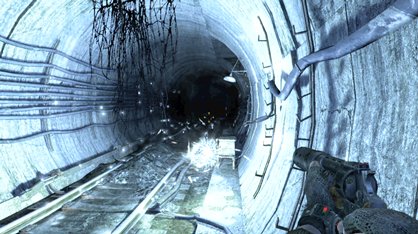
There’s no blinking arrow in the centre of the screen to guide you forwards and little in the way of hand-holding. Struggling to open a door? The solution might well involve working your way into a neighbouring room to blast away the plank of wood wedging the handle, or to blast the anchors of a chandelier’s cabling and swing the broken light into the entrance. Very PC, very Half-Life, and we’re sure you’ll agree that any game taking its cues from Valve’s masterpiece is going to be worth a look.
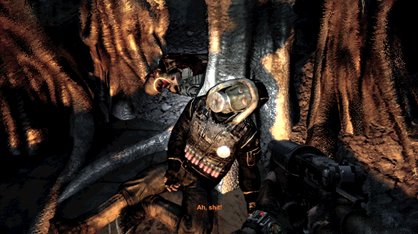
Above: If you’re toosqueamishto ransackcorpses, you're through
4A Games have approached Metro 2033 with all the confidence of a Valve, and a healthy portion of the talent too. The game boldly flits between solo and cooperative missions with just the right balance, and occasionally spices up the mixture by throwing you into a few (actually, genuinely superb) on-rails section when you least expect it.
What really resonates, though, is how the game hasn’t been dumbed down for consoles. Fail to keep your torch topped up and you might just miss a hidden tripwire which hurls a spiked pendulum into your noggin. Ignore the audio cues that indicate a crumbling ledge and you’ll be dunked into toxic soup before you know what’s happened. Metro 2033 is never unfair – 4A mercifully fixed the ammo and difficulty spikes present in last month’s preview code – but, simultaneously, it’s far from forgiving.
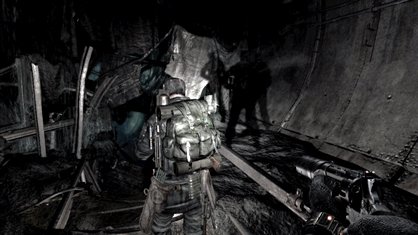
Fortunately, some truly inspired level design has an uncanny ability to make you feel clever. One set of tunnels plays home to a war between the Reds and the Nazis. (Yes, future Nazis.) Holster your weapon and it’s possible to remain undetected for the entire chapter. Careful sneaking will lead you to the scene of an execution; a soldier is on trial for desertion of his post and, as he pleads to his captors, he reveals that he was trying to flank the enemy forces by using a secret passage. Follow his instructions and you too can use the spaghetti-like collection of pipes to crawl beneath the battles above, completely subverting your involvement in the tussles between the factions. And, as you sneak under the walkways, you’ll feel like you’ve genuinely outfoxed everybody else.
More info
| Genre | Shooter |
| Description | This post-apocalyptic, survival-horror, real-fantasy setting, first-person-shooter may be high concept (and full of hyphens), but it looks frighteningly promising. |
| Platform | "PS3","Xbox 360","PC" |
| US censor rating | "Mature","Mature","Rating Pending" |
| UK censor rating | "Rating Pending","Rating Pending","Rating Pending" |
| Alternative names | "Metro 2033: The Last Refuge" |
| Release date | 1 January 1970 (US), 1 January 1970 (UK) |
